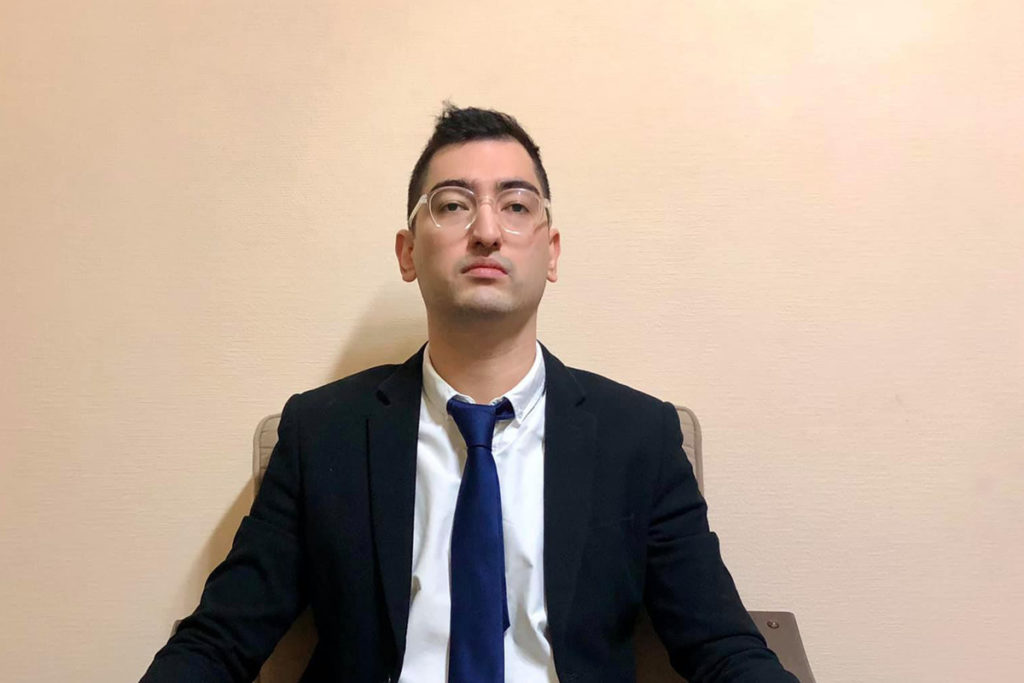Miraziz Bazarov was sentenced to three years’ limitation of freedom of movement for defamation. A critic of President Shavkat Mirziyoyev and a supporter of LGBTQI rights, the Uzbek blogger was attacked with a baseball bat by unknown assailants in March 2021 and seriously injured. This article was originally published on Novastan’s German website on 23 January 2022. The verdict was announced on the second day of the trial. A criminal court in Tashkent, the capital of Uzbekistan, found the famous blogger Miraziz Bazarov guilty on 21 January of “defamation on the internet for heinous and selfish motives.” As reported by the Uzbek media Gazeta.uz, Bazarov received the maximum sentence authorized for this type of offence – three years’ limitation of freedom of movement.
Bazarov will serve the remainder of his sentence, two years and four months, under house arrest. He has already been under house arrest since the end of April 2021, as reported by Radio Ozodlik, the Uzbek branch of the American media Radio Free Europe. Time already served will be deducted from his total sentence. As the blogger’s mother told Russian media Fergana News, the judgment involves a ban on using the Internet and working as a psychologist. He is also prohibited from going to public events, cafés and restaurants. He is not allowed to consume alcoholic beverages and must stay home from 8pm to 8am. Bazarov’s lawyer, Sergei Mayorov, called the judgment against his client unfair. “Formally, the court acted in accordance with our legislation, but of course it is a biased court and it is the fulfilment of the will of the state,” the lawyer told Radio Ozodlik. He will advise his client to appeal the decision.
A well-known critic
Miraziz Bazarov was best known for his Telegram channel and his TikTok account. He notably criticized Uzbek President Shavkat Mirziyoyev and called for a boycott of the presidential election last October. The blogger is also well known for his commitment to the rights of homosexuals. Bazarov considers these to be aspects of individual freedom, as discussed by Radio Free Europe, and insists that he is not an LGBTQI activist, but a defendant of the privacy of individuals. Same-sex relations between men are considered “sodomy” in Uzbekistan and are punishable by prison terms of up to three years, reports the British NGO Open Democracy. Read more on Novastan:LGBTQIA Muslims: “An online imam with background music is hardly the absolute truth” On the evening of 28 March 2001, Bazarov was seriously injured when unidentified assailants attacked him in the street with baseball bats. The blogger was hospitalized with an open leg fracture, head trauma and bruising. On the same day, Bazarov invited anime and K-pop fans to gather in central Tashkent. But the event had to be cancelled because a crowd of unidentified men staged an unauthorized protest there against LGBTQI activists. The link with the subsequent attack on Bazarov has not yet been formally established. The perpetrators have not been arrested to date. As Gazeta.uz reports, the Uzbek Interior Ministry then published a video in which the blogger was indirectly held responsible for the anti-LGBTQI protests. “Miraziz Bazarov repeatedly demonstrated his depraved behaviour, deliberate disregard for the rules of conduct of society and the dissemination of humiliating antics, contrary to national culture, on social networks” the video states.
From hospital to house arrest
Upon being released from the hospital on 29 April, after more than a month of hospitalization, Bazarov was placed directly under house arrest as a “preventative measure.” He was only released shortly before the start of his trial after several extensions, reports Fergana News. According to Radio Ozodlik, the Tashkent police said they received a total of 28 requests from citizens from 1-20 April, as well as a collective request from the teaching staff at a school, demanding legal action against the blogger. Teachers took offence at a video by Bazarov from October 2020, in which he said the school was a place “where old slaves and failures teach children to be slaves and failures.” As Radio Ozodlik reported on 14 May 2021, accusations from three bloggers were added to these complaints. Bazarov had accused them of moral harassment before the attack, and is said to have “received hundreds of death threats from their subscribers because of slanderous information disseminated by bloggers close to the government.” However, the judicial authorities allegedly ignored the information Bazarov had provided about these threats.
A blow to press freedom
But the blogger’s conviction isn’t the only blow to press freedom in Uzbekistan. From the start of the trial on 20 January, the court made it clear that it did not want independent reporting taking place. As Fergana News reported, reporters were only able to attend the trial, which was declared an open session, if they could present a recent PCR test. The catch was that this rule only applied to journalists and was not announced in advance. In addition, Sergei Mayorov made it known that the judge had prohibited anyone from disseminating information about the progress of the trial. “Until the end of the trial, no comments by the participants may be published in the media or disseminated in any way. That is why we do not have the right to make trial proceedings public,” explained Bazarov’s lawyer. This information was confirmed by the court to Fergana News. Despite a relative liberalization of the press after Shavkat Mirziyoyev, who was seen as a reformer, came to power in December 2016, journalists remain under heavy political pressure in the country. In June 2021, media outlets Kun.uz and Azon.uz were penalized with heavy fines for running articles with religious content. In the Reporters Without Borders 2021 press freedom rankings, Uzbekistan ranks 157 out of 180 countries. With the conviction of Miraziz Bazarov, the situation will likely see little change in 2022.
Written by Robin Roth
Translated from German by Matthew Deveraux
Edited by Mari Paine
For more news and analysis from Central Asia, follow us on Twitter, Facebook, Telegram, Linkedin or Instagram.
 Uzbekistan: independent blogger sentenced to three years’ house arrest
Uzbekistan: independent blogger sentenced to three years’ house arrest 



